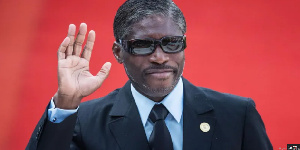- Home - News
- Polls
- Year In Review
- News Archive
- Crime & Punishment
- Politics
- Regional
- Editorial
- Health
- Ghanaians Abroad
- Tabloid
- Africa
- Religion
- Election 2020
- Coronavirus
- Photo Archives
- News Headlines
- Press Release
General News of Monday, 21 November 2016
Source: classfmonline.com
Dec polls: Too late to preach peace – Aning
A security analyst with the Kofi Annan International Peacekeeping and Training Centre (KAIPTC), Dr Emmanuel Kwesi Aning, has said rewarding people who perpetrate political violence has been solidified in the minds of political party supporters to the extent that it has become too late to talk about peace, ahead of the 7 December polls.
Many stakeholders like the National Peace Council, the Ghana Police Service, the Electoral Commission, and others have been preaching peace ahead of the polls following violent clashes between supporters of the governing National Democratic Congress (NDC) and the New Patriotic Party (NPP).
But speaking on the Executive Breakfast Show (EBS) on Class91.3FM on Monday, 21 November, Mr Aning bemoaned the culture of rewarding violent supporters.
“Because violence now has financial and economic value, there is a certain subconscious acceptance that violence is good and actually does have positive pay off if your party eventually wins. ...But it’s too late now talking peace and telling people that peace is what should drive our action towards the election. Right now, the position has been taken. It is solidified and if you listen to the language coming from the foot soldiers, there is a certain preparedness that were you to do this, we will retaliate and I think the CDD study shows widespread acceptability and the willingness to use violence in the election,” he stated.
Explaining why he postulates that it is too little to preach peace in this year’s election, Dr Aning said: “People are making rational thoughts. If I use violence on behalf of my party and were I even to be arrested, somebody will make a call and get me off the hook. And if my party were to win and I’m noticed as one of those who used violence as a tool on their behalf, I will get something because if you look across board, over the last 20 years, there is a direct correlation between those who use political violence or hateful speech and then those who get access to political office, and it is that history and culture of violence in our politics that triggers off or leads to some political appointments. That is why I’m saying it is too little too late.”











